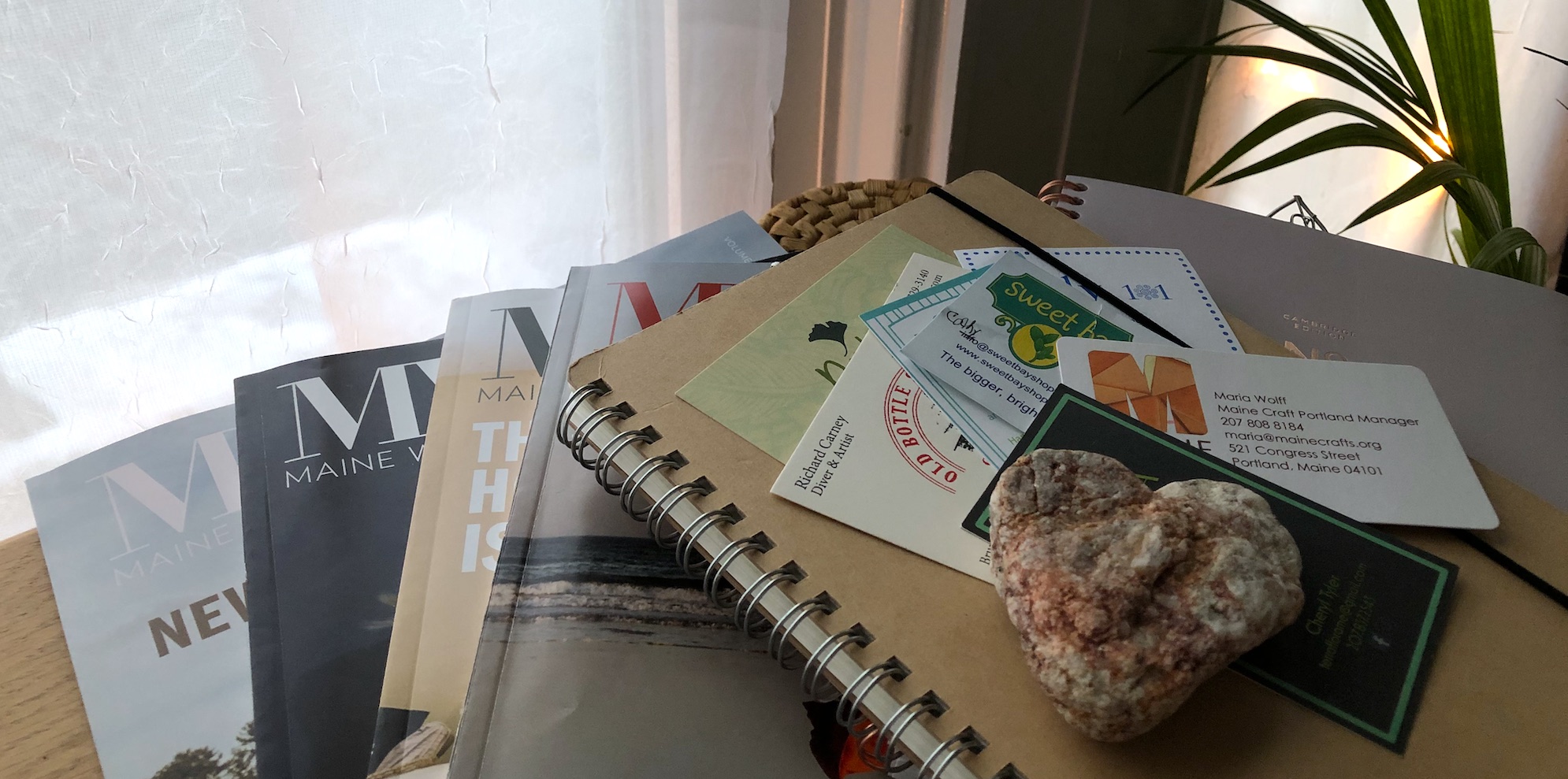
In October 2017, I had coffee with a friend, a woman I had worked with while soliciting art for the Children’s Museum & Theatre of Maine auction. I was beginning to think about freelance writing, and I knew she had contacts in the publishing world. She connected me with three of her colleagues, all editors for local publications. Two did not respond. One did and said she would keep me in mind.
I know what you’re thinking, but fear not. This story has a happy ending.
Fast forward to October 2018. That one responder, an editor at Maine Women Magazine, sent me an email out of the blue and offered me a writing assignment. I was thrilled, to say the least. At this point my portfolio of writing samples was virtually non-existent; she was giving me the job based on my blog posts and the word of my friend. I suppose she figured worst case, she’d have to rewrite my article. Best case, she would have a new writer to call upon. The assignment was to write vignettes (aka ‘literary sketches’) about two woman working in traditionally male-dominated industries. The stakes felt high. These were women who had accomplished extraordinary things. I wanted to do them justice, and I only had 400 words to do it in. I’m used to having to rein myself in to not exceed 400 pages when I write fiction. 400 itty-bitty-teeny-weenie words make up basically one page.
NBD, I told myself. I’ll just have to be concise. Then I started thinking about everything else. Cue imposter syndrome panic. It went something like this:
I’m not a journalist. I don’t know the rules. I haven’t conducted an interview since I wrote for my high school newspaper twenty years ago. And the editor wants quotes. As in, get their exact words and print them. Terrifying. What if I don’t get it exactly right? Can I be sued for defamation? Can I potentially ruin someone’s reputation? Can I ruin my own? Are these the cruel stakes of journalism and I have to adapt or perish? What the f%&k am I getting myself into?!
To Google I went.
We all know Googling can lead the most logical among us into black holes of terrifying, wholly inaccurate, biased and highly anecdotal information. That didn’t deter me. Luckily in this case, Google spit out seemingly credible information that assuaged my worst fears.
It turns out, most people don’t remember *exactly* what they said in an interview. And unless you misquote in a way that blatantly disparages the interviewee, the chances of him or her pressing the issue are slim.
I bought a digital recorder anyway. Just in case.
The first interview was done over the phone. I sent questions to the interviewee ahead of time for her to think about and printed them for my own reference during the call. My laptop was open, so I could type notes. My phone was on speaker. The digital recorder was rolling. I had notebook and pencil at the ready in case of a total power failure or technology meltdown. The apocalypse could have been at my doorstep and I still would have gotten that interview. The second interview was in person. All the same support systems followed me to her office — again, in case of global disaster.
In both cases, the women I spoke with were gracious, easy to talk to, and more than willing to share their personal stories.
Phew.
After I had my content, the writing part felt familiar. The biggest challenge was whittling it down to 400 words. There was so much good stuff there! And I was still worked up about the quotes. So worked up, in fact, that I let the women read the quoted content before I submitted the article. Apparently that’s a journalistic no-no (oops), but when all was said and done, the editor praised the article (…and maybe didn’t even know how much I’d fumbled and stressed. That’s what I’m telling myself, anyway…)
Since those two vignettes, I’ve conducted twenty more interviews for other assignments. I still use the voice recorder if the stakes feel high, but usually it’s me scribbling in my notebook or typing fast on my laptop. I’m getting better at capturing quotes. I’m worrying less about being sued.
A friend recently asked me which I liked better, writing articles or writing fiction. I told him they are two very different animals. I like that I can write an article in a day and see it published a month later. It’s validating. It feels like hours well spent. And I get paid. But there’s been a learning curve. Most notably, I have to rely on outside sources for content, which, given my type-A, slightly control-freakish personality, can be nerve-wracking. With fiction, all I rely on is an idea and my imagination.
My final answer: I love writing fiction. I also love seeing my work in print.
My (real) final answer: At this point I’ll write just about anything, and I’ll take the (learning) curves as they come.
